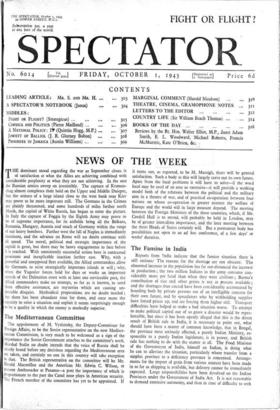The Mediterranean Committee
The appointment of M. Vyshinsky, the Deputy-Commissar for Foreign Affairs, to be the Soviet representative on the new Mediter- ranean Commission, is very much to be welcomed as a sign of the importance the Soviet Government attaches to the committee's work. Marshal Stalin no doubt intends that the voice of Russia shall be dearly heard before any decisions regarding the Mediterranean area are taken, and certainly no one in this country will take exception to that. The British representative on the committee will be Mr. Harold Macmillan and the American Mr. Edwin C. Wilson, at ptesent Ambassador at Panama—a post the importance of which is' Proportionate to the part the Canal zone plays in American security. The French member of the committee has yet to be appointed. If it turns out, as reported, to be M. Massigli, there will be general satisfaction. Such a body as this will largely carve out its own future. Apart from the local problems it will have to solve—if the word local may be used of an area so extensive—it will provide a working model both of the relations between the political and the military arm in a theatre of war, and of practical co-operation between four nations on whose co-operation in greater matters the welfare of Europe and the world will in large measure depend. The meeting between the Foreign Ministers of the three countries, which, if Mr. Cordell Hull is to attend, will probably be held in London, may be of greater immediate importance, and the later meeting between the three Heads of States certainly will. But a permanent body has possibilities not open to an ad hoc conference, of a few days' or weeks' duration.


























